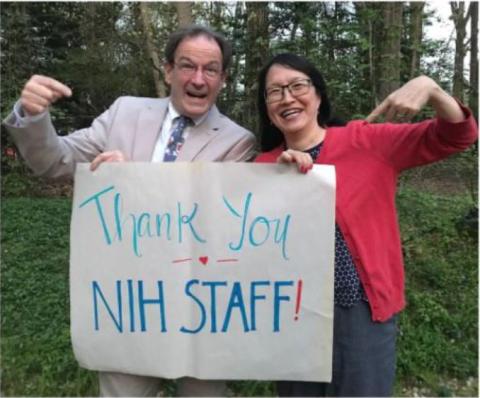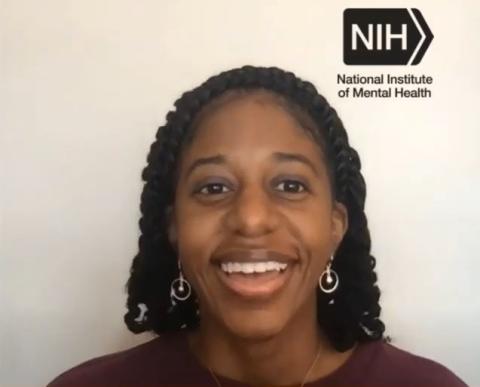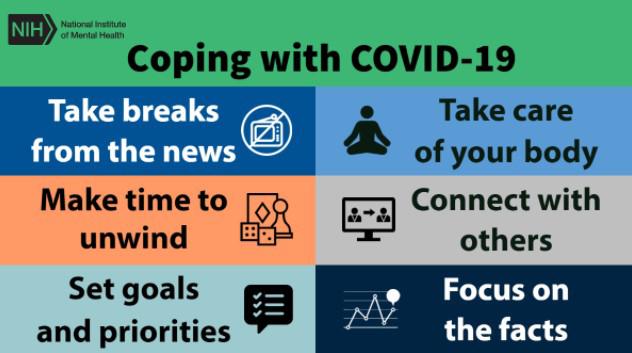NIMH Investigators Discuss How to Power Through Pandemic, Move Beyond
As we mark a year since the pandemic began, we look back on a year filled with long bouts of social isolation, seemingly endless Zoom meetings and virtual chats with people we miss seeing in person, and the persistent stress of navigating through not-normal times.
‘People Are Resilient’

The Covid-19 pandemic anniversary is a good time to pause and take stock of the year’s challenges and silver linings, said Deborah Snyder, NIMH’s special advisor to the clinical director.
“I don’t know many people who have gone untouched by Covid-19,” she said. “Pay attention to your mood, thoughts, actions. Figure out what you can, for now, and work on letting go what you can’t. Make time for paying attention and expanding your own coping strategies.”
She advised employees to acknowledge the professional and personal difficulties of the past year but also reflect upon what got them through.
“Our brains are hard-wired to scan for the negative,” she explained. “But, it’s just as important to focus on the positive, such as the grit and ingenuity that allowed us to power through.”
For Snyder, that means getting back to the basics, connecting to experiential sources of meaning, “love, beauty, nature, humor and gratitude.”
“It’s normal to experience ups and downs—especially during such a challenging year,” said Dr. Maryland Pao, NIMH’s clinical and deputy scientific director. “People are resilient and find a way to get through,” said Pao. “Just look at all the things we accomplished during this time.”
NIH was part of the historic and unprecedented effort to develop effective testing and Covid-19 vaccines within a year.

Over the summer, NIH confronted another significant challenge to health: systemic and structural racism. Following the activism after George Floyd’s death while in police custody, NIH launched efforts to end structural racism and racial inequities in biomedical research.
“We are reexamining how we behaved in the past and how we want to be going forward. We are taking a closer look at how we truly make our organization more diverse at all levels, including leadership,” said Pao. “We are also reexamining what hospital care looks like.”
The pandemic has illustrated the importance of relying on others, when needed. Snyder said social support is a “key ingredient” to psychological and physical health.
Many NIH employees have been working non-stop for months to help fight the pandemic. While these efforts are necessary, they are unsustainable long-term.
“While some NIH’ers have had to, we can’t live at a heightened state of readiness all the time,” she noted. “You need to take time for yourself, otherwise you’re not going to be good to anyone around you. It’s important for our physical and mental health.”
‘A Bit of a Roller Coaster’

There will be permanent changes resulting from the pandemic. “It’s hard to imagine that we’re going to go back to what work life looked like in say, February 2020,” she said. It’s impossible, however, to predict what will become the new normal. A lot of those questions will remain unanswered for a while.
“We’re making it up as we go along because no one’s ever lived through a pandemic in recent memory before, except for a few in their 100s,” said Pao. “People are scared of being around a lot of people, but they’re also excited by it. It’s going to be a bit of a roller coaster.”
Employees who have been teleworking, for example, will have to work with their supervisors to devise personalized alternative work schedules. Maximum telework has also highlighted the importance of face-to-face communication—especially in a discipline as collaborative as science.
“We have to be ready to experiment within our own offices and be open to doing our own little clinical trials on how our physical spaces and workstations affect our productivity and morale,” Snyder said. “We have to be patient with each other, but that is the nature of good collaborative science.”
The ground has been quivering underneath us for the last year and it will continue to quiver for a bit more time. “We’ve got this. We just have to figure out how to get through the challenging moments, soak up the moments we should be grateful for and focus on doing what we can together,” Snyder assured.
Over the next few months, Pao thinks most people will be surprised at how well they handled the past year. “We’ll remember how we like to connect with each other in person. That joy will come back.”
Preparing to Reenter the World

While months of continued vigilance remain, along with the hope of normal times ahead, we may feel stressed as we psychologically prepare to reconnect and interact more in person—to rejoin the world.
“The social isolation and significant reduction in time spent around other people has significantly impacted children, adolescents and adults,” said Dr. Krystal Lewis, a clinical psychologist at NIMH. So it’s only natural that many people will have difficulties adjusting to being back in public—returning to workplaces and schools, going to crowded stores, driving with more traffic, being in close quarters with strangers and just seeing more people out and about.
“I would recommend a slow integration back into daily life,” said Lewis. “Gradually increase trips outside the home while wearing a mask and staying socially distanced to increase comfort around others.” And bring the kids, added Lewis, who specializes in pediatric anxiety. Children also will need practice readjusting to all kinds of public places.
Once vaccinated and comfortable, start getting together with friends and family who are also vaccinated, reacclimating to those in-person gatherings. As the weather gets warmer, we can organize outdoor activities again while waiting for a time when it’s safe to gather indoors around larger crowds.
Recently, Lewis appeared in a brief NIMH video offering additional coping strategies for the months ahead. She recommended taking mini breaks throughout the day and making time for self-care prior to feeling overwhelmed.
“Keeping a routine is a key piece to maintaining some sense of normalcy,” she said. When feeling anxious, try to focus on what’s in your control. Create schedules and deadlines, but “change your expectations of daily productivity and accept that this is your norm right now…Pay attention to your physical and mental fatigue…Practice self-compassion.”
Think of the acronym GREAT: find small things each day about which you feel Grateful; integrate Relaxation into your day; Exercise; Acknowledge your feelings and accept them; Track your thinking.
During challenging times, it’s normal to experience a wide range of emotions—fear, anger, even grief, she said. To help restore a sense of calm, Lewis recommended what she calls disrupting anxiety.
“Once you’re aware of the anxiety, you can do certain things to disrupt the worrying and anxious feelings,” she said. “Challenge anxious or irrational thoughts by reframing your worries…Once you catch yourself experiencing unhelpful thoughts, you can say [to yourself], ‘I’m doing the best I can.’”
And, remember to ask for help. If you’re overwhelmed with anxiety or worry about the prospect of reentering the world, a therapist can offer strategies to better manage the fear.
“Often, when we feel stressed and anxious, it’s because we don’t believe we can handle things,” said Lewis. “However, this is a reminder that we are stronger than we believe, and we can get through this.”

